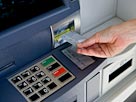 How debit card consumers choose and use their personal passwords and PIN numbers may well affect their risk of being victimized by financial fraud.
How debit card consumers choose and use their personal passwords and PIN numbers may well affect their risk of being victimized by financial fraud.
It’s an appropriate topic given that June is ATM & Debit Card Safety Awareness Month, an issue your grandparents didn’t see coming 30 years ago, but some law enforcement authorities sure did.
Consumers who give debit card fraud short shrift do so at their own risk. According to Javelin Research, debit card fraud accounted for 36% of all payment card fraud in 2010, up from 27% in 2009. Debit card fraud is more vexing for consumers than credit card fraud, as debit card fraud is rarely insured, and the losses come straight out the consumer’s bank account and can’t easily be tracked.
“Debit cards aren’t monitored as thoroughly as credit cards,” says Javelin in its 2011 Identity Fraud Survey Report. “Visa and MasterCard networks have more thorough histories on individuals and can spot suspicious transactions faster. The debit card network, however, relies on the consumer’s transaction history with a specific financial institution, not the entire Visa and MasterCard system, according to the Identity Theft Resource Center, a nonprofit consumer education organization in California.”
Javelin says the average debit card fraud amount was $2,529 in 2010.
One key contributor to debit card theft may be self-inflicted. A new study from PULSE, a Houston-based debit/ATM network, says that consumer personal identification numbers (PINs) — at least, how they’re used — may well set the stage for debit card fraud.
“It’s no secret that weak PINs such as a birthday or repeating or sequential numbers contribute to card fraud,” Eric Lillard, the director of fraud operations at PULSE, said in a statement.
Lillard points to a recent report from Cambridge University Computer Laboratory in West Cambridge, U.K., showing that one of every 11 debit cards has “easily discovered PINs.” (Post continues below.)
What’s a debit card consumer to do?
PULSE says consumers and financial institutions should discourage the use of birthdays as PINs — they’re too easy for thieves to crack. In fact, any “easily guessed pin” such as a wedding anniversary or numbers from your zip code should be dropped like a hot potato.
Here are some other tips from PULSE:
Monitor your financial account statements: Track your bank accounts online daily so that any suspicious activity is spotted quickly. Switch from postal delivery of statements to online access or ensure that mailed statements are sent to locked boxes and not left available to fraudsters.
Protect your wallet, purse and PIN: Don’t carry items with private information such as your Social Security number in your pocketbook or wallet. Also, PULSE says not to share your PIN with anyone. That means don’t write it down and don’t give it to a clerk or anyone else to enter for you.
Be extra alert at ATMs: Don’t use an ATM if it is in an unlit or hidden area. Block the keypad while entering your PIN so you can’t be observed. If an ATM looks phony or has a suspicious card reader that is loose or not part of the main body of the machine, do not use it.
Protect your online shopping: Update computer anti-virus software, anti-spyware and firewalls. New attacks come frequently, and your software provider will frequently send updates to stop them. Use only secure sites and network connections when shopping online.
Protect personal information online: Limit social media access to friends only and don’t “friend” people you don’t know. Fraudsters use personal information such as birth dates, family and pet names, high schools and birth cities to “verify” your identity.
Debit card fraud is serious business, with the potential to separate you from thousands of dollars drained right out of your checking account. Don’t give bank fraud thieves a bigger edge by going lax on your debit card security.
If you do, expect to pay a stiff price.

